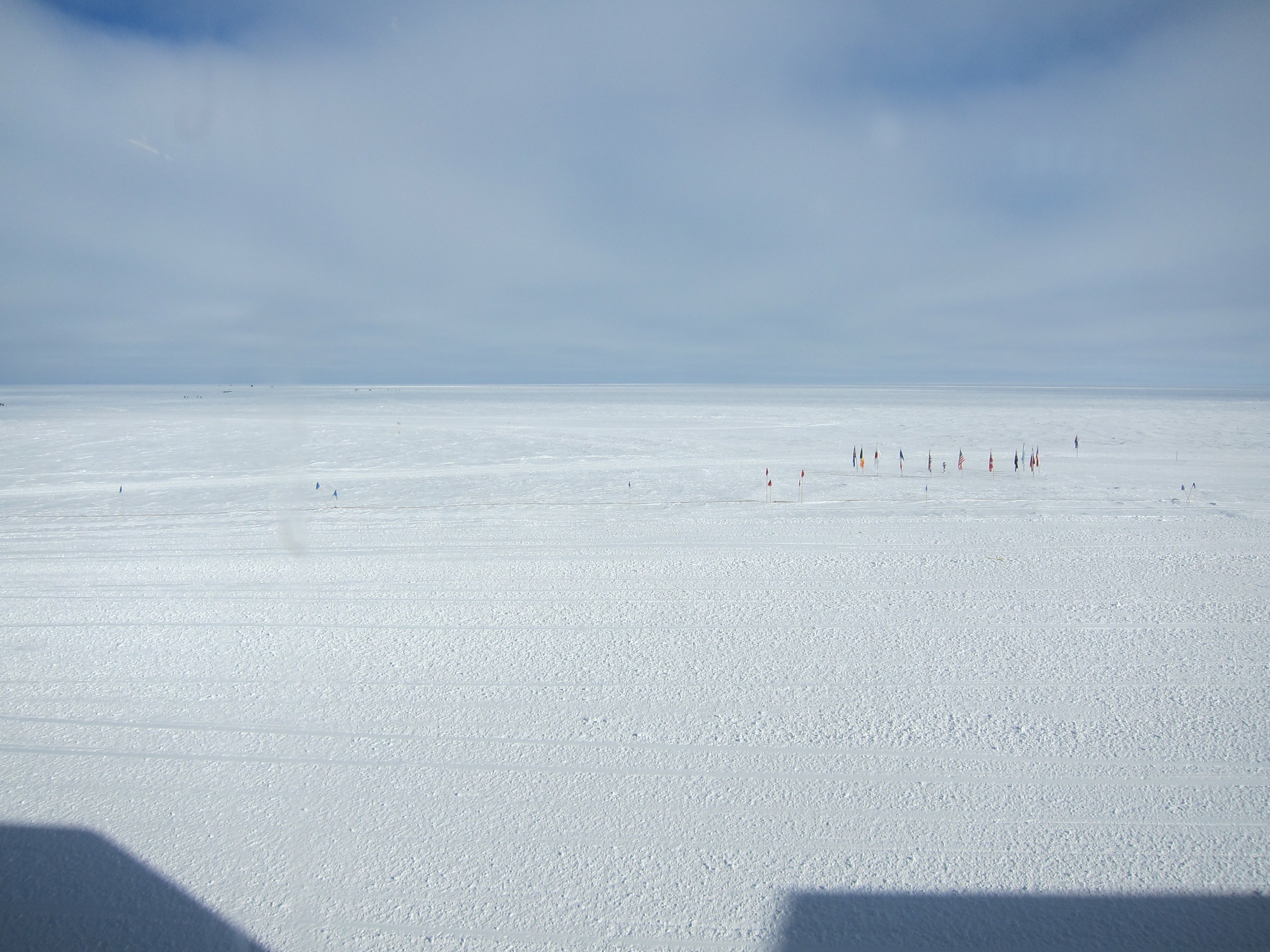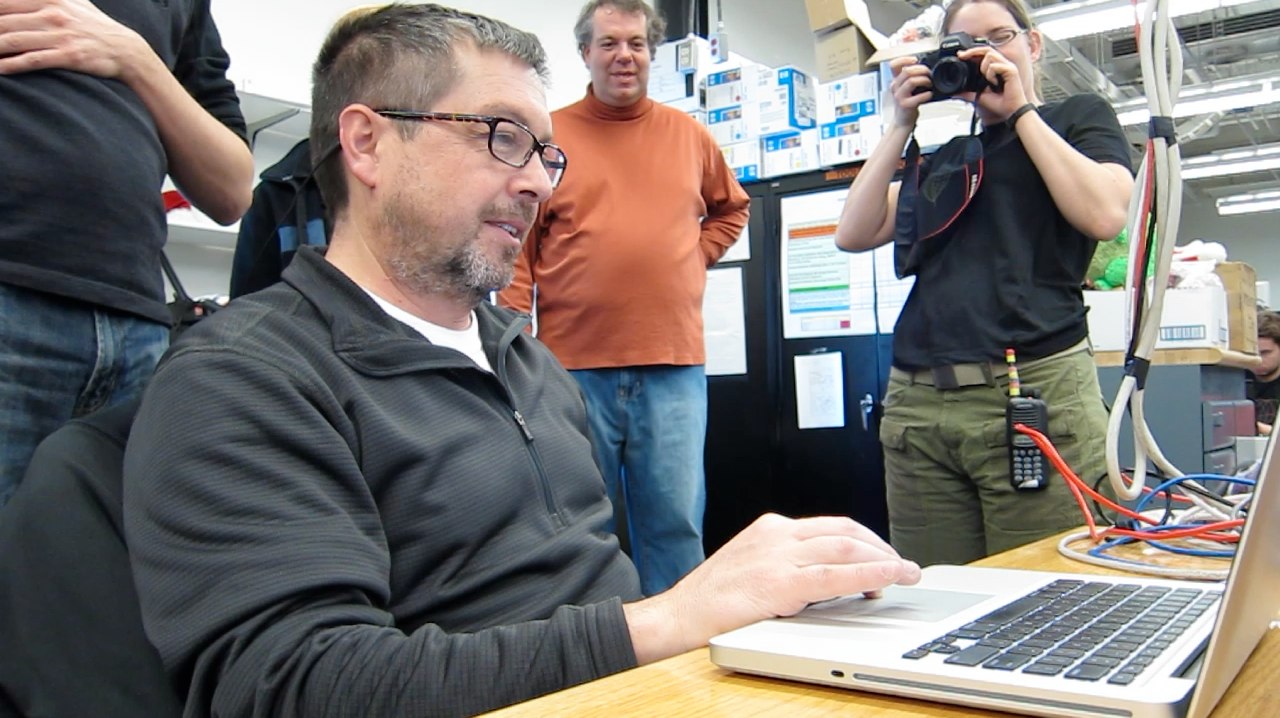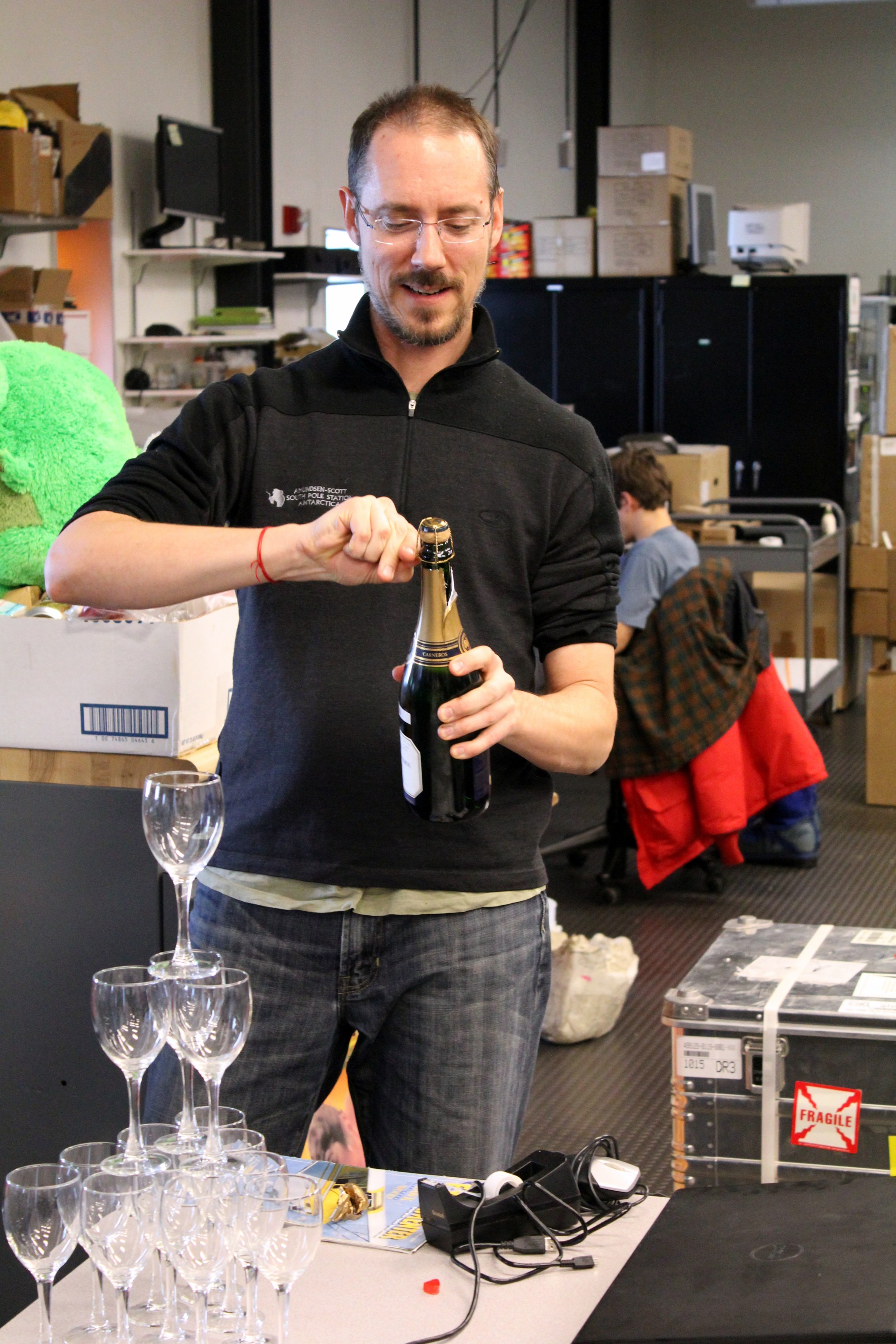Fruition
southpole
Tuesday, January 18, 2011
Back in the Galley again, the smell of dozens of lunch burgers grilling and the very same licorice spice Stash tea I always drink here setting the olfactory tones for this post.
Almost exactly twenty years ago, when I was working at CERN in Geneva, Switzerland, I was preparing to return to Madison to take some art classes and I emailed some physics colleagues there to see if there was any student work to be had. Colleagues Bob Morse and Francis Halzen replied that there was a new project under way, which was to build a neutrino detector in the Ice in Antarctica. Bob had done an experiment at the Pole to detect cosmic rays, and Francis was a particle theorist who specialized increasingly in astro-particle physics, and neutrinos in particular. Computer simulations were needed to see how effective light sensors, placed deep in the ice, might be at detecting neutrinos.
What started as an art-school day-job turned into a doctorate in physics as the Antarctic Muon and Neutrino Detector Array (AMANDA) became a reality and the computer simulations I and other students wrote became important tools for the understanding of the data from the first instruments deployed by the growing collaboration in the polar ice cap. But in the very earliest years, it was understood even by using back-of-the-envelope calculations that a much larger detector would be needed… a Cubic kilometer of Ice, in fact … an Ice Cube. AMANDA paved the way by detecting high-energy neutrinos, by setting limits on astrophysical sources, and, perhaps most crucially, by providing technological prototypes for the hot water drilling which would be needed to deploy the sensors, and for the design of the sensors themselves which evolved from simple photomultiplier tubes at the ends of long coaxial cables to sophisticated computers in their own right which would provide the maximum signal quality by digitizing the light down in the ice and sending them to the surface with no loss of signal quality.
The difficulties faced by AMANDA were daunting. The drilling in particular was an immense engineering challenge, requiring a kind of specialized expertise found in only a handful of individuals (if that many) worldwide. One man in particular, the late Bruce Koci, brought a kind of preternatural understanding, intuition and tenacity to the task which allowed the 2-km holes for the AMANDA instrument to be drilled successfully, though not without delays, logistical and engineering nightmares, burst hoses, and endless worry Collaboration-wide. After the holes were drilled, deployments of the “strings” of sensors themselves were an ordeal in their own right, sometimes involving ‘stuck’ strings, free-falling cables, injuries and, in the best of times, 20-hour deployments out-of-doors in a single shift (one of my most vivid memories of these deployments was the enormous amounts of food one could eat during the breaks, and the utter contentment of exhaustion when the task was done).
Handling the data in AMANDA times was a challenge in and of itself. The data volume and mathematical complexity of the analysis strained the computing resources available at the time; crunching the numbers to find the first neutrino candidates required time on Cray supercomputers and a scrum of dedicated grad students and postdocs working at the limits of their programming abilities.
Since it was understood that AMANDA would eventually give way to a larger instrument, work began well before the final stages of AMANDA to design the IceCube detector and to procure funding. Several competing prototype designs for a next-generation sensor were created and tested in later AMANDA deployments, including a design created while I was at LBNL in Berkeley. The LBNL “Digital Optical Module” (DOM) took some of the signal processing computations down into the ice itself in order to get the maximum signal quality. Though more sophisticated (and expensive) than the usual AMANDA modules, the interface to the surface required only the usual copper coaxial cables, with far better quality of data. A test AMANDA “string” (#18) deployed in 2000 worked well enough (barely!) to show that the DOM technology was workable and could be used to detect particles in the ice. The early LBNL prototype would be extensively improved for IceCube.
IceCube itself received a first real jolt of funding in 2002 and work began to quickly implement the vision of a kilometer-cubed detector. I was put to work on the communications interface which would connect the deployed DOMs down in the ice to a network of off-the-shelf computers running on the surface, a design which would make IceCube an experiment with relatively little custom-built electronics from a high-energy physics standpoint (the DOMs, cables, and a computer interface card plugged into a commodity chassis are the only hardware we had to design ourselves… the rest of the experiment looks like a data center you’d find at any medium-sized Internet company).
The first three IceCube holes were planned for early 2005, but the first version of the new drilling equipment (an enormous engineering task in and of itself) proved exceptionally challenging, and after an injury in the drill camp and many other difficulties, the first IceCube string was deployed in early January. After freeze-in, the DOMs were powered on for the first time by National Science Foundation Representative Jerry Marty and Station Manager BK Grant, with all of us watching with bated breath to see if the DOMs communicated. They did.
The following seasons were all very challenging. Drilling improved substantially with experience, with 8, 12, 19, 19, 20 and 7 strings deployed in the following years, respectively. Software was written, and rewritten, to read out the data generated by 5500 DOMs and to progressively reduce the huge volume of noise to a size small enough to be sent over the satellites to the North. Tasks such as writing the embedded software for the DOMs themselves, to the system which sifts through the detected light to “trigger” on signals from real particles traveling through the Ice, to the filtering of these particles for neutrinos, to the overall control and monitoring of the system, to the simulation of the entire process to be able to make firm quantitative statements about what we are seeing — all this has taken a tremendous amount of effort, collaboration, acquisition of knowledge and skill, political struggles, failures and triumphs.
It has seemed that since we started this project, there has been barely enough time to catch one’s breath. Now we are at the end of the construction of this utterly strange device. I have put nearly a decade of my life into this project alone. If you count AMANDA, I have spent almost half my life in this field.
Last night we took the first runs with the completed IceCube detector — all 86 strings. Though hopefully the experiment will run for decades, in some sense last night’s runs were for me the fruition of years of effort, since I have been more a builder than a user of this instrument. I was going to write more about how it feels to hit this milestone (one which I was never at all certain we would reach), and less about the history… but how I feel seems somehow not that important right now. We built it. Many of us. It is good. May it run long and see deep into the fabric of things. May it teach all of us about many new and beautiful things. May we all benefit from working together and take the knowledge gained, from the trivial to the profound, out into the world to do good things.
Time to greet the dozen or so of new IceCube arrivals from the flight landing now — the last big batch of ‘Cubers for the season… maybe the last big batch ever.
Blog Posts (170)
Select from below, view all posts, or choose only posts for:art clojure code emacs lisp misc orgmode physics python ruby sketchup southpole writing
From Elegance to Speed code lisp clojure physics Wednesday, September 25, 2019
Common Lisp How-Tos code lisp Sunday, September 15, 2019
Implementing Scheme in Python code python lisp Friday, September 13, 2019
A Daily Journal in Org Mode writing code emacs Monday, September 2, 2019
Show at Northwestern University Prosthetics-Orthotics Center art Saturday, October 20, 2018
Color Notations art Thursday, September 20, 2018
Painting and Time art Tuesday, May 29, 2018
Learning Muscular Anatomy code clojure art emacs orgmode Thursday, February 22, 2018
Reflections on a Year of Daily Memory Drawings art Monday, September 18, 2017
Repainting art Sunday, May 14, 2017
Daily Memory Drawings art Tuesday, January 3, 2017
Questions to Ask art Thursday, February 25, 2016
Macro-writing Macros code clojure Wednesday, November 25, 2015
Time Limits art Saturday, April 25, 2015
Lazy Physics code clojure physics Thursday, February 12, 2015
Fun with Instaparse code clojure Tuesday, November 12, 2013
Nucleotide Repetition Lengths code clojure Sunday, November 3, 2013
Updating the Genome Decoder code clojure Saturday, July 13, 2013
Getting Our Hands Dirty (with the Human Genome) code clojure Wednesday, July 10, 2013
Validating the Genome Decoder code clojure Sunday, July 7, 2013
A Two Bit Decoder code clojure Saturday, July 6, 2013
Exploratory Genomics with Clojure code clojure Friday, July 5, 2013
Rosalind Problems in Clojure code clojure Sunday, June 9, 2013
Introduction to Context Managers in Python code python Saturday, April 20, 2013
Processes vs. Threads for Integration Testing code python Friday, April 19, 2013
Resources for Learning Clojure code clojure Monday, May 21, 2012
Continuous Testing in Python, Clojure and Blub code clojure python Saturday, March 31, 2012
Programming Languages code clojure python Thursday, December 22, 2011
Milvans and Container Malls southpole Friday, December 2, 2011
Oxygen southpole Tuesday, November 29, 2011
Ghost southpole Monday, November 28, 2011
Turkey, Stuffing, Eclipse southpole Sunday, November 27, 2011
Wind Storm and Moon Dust southpole Friday, November 25, 2011
Shower Instructions southpole Wednesday, November 23, 2011
Fresh Air and Bananas southpole Sunday, November 20, 2011
Traveller and the Human Chain southpole Thursday, November 17, 2011
Reveille southpole Monday, November 14, 2011
Drifts southpole Sunday, November 13, 2011
Bon Voyage southpole Friday, November 11, 2011
A Nicer Guy? southpole Friday, November 11, 2011
The Quiet Earth southpole Monday, November 7, 2011
Ten southpole Tuesday, November 1, 2011
The Wheel art Wednesday, October 19, 2011
Plein Air art Saturday, August 27, 2011
ISO50 southpole art Thursday, July 28, 2011
SketchUp and MakeHuman sketchup art Monday, June 27, 2011
In Defense of Hobbies misc code art Sunday, May 29, 2011
Closure southpole Tuesday, January 25, 2011
Takeoff southpole Sunday, January 23, 2011
Mummification southpole Sunday, January 23, 2011
Eleventh Hour southpole Saturday, January 22, 2011
Diamond southpole Thursday, January 20, 2011
Baby, It's Cold Outside southpole Wednesday, January 19, 2011
Friendly Radiation southpole Tuesday, January 18, 2011
A Place That Wants You Dead southpole Monday, January 17, 2011
Marathon southpole Sunday, January 16, 2011
Deep Fried Macaroni and Cheese Balls southpole Saturday, January 15, 2011
Retrograde southpole Thursday, January 13, 2011
Three southpole Wednesday, January 12, 2011
Transitions southpole Tuesday, January 11, 2011
The Future southpole Monday, January 10, 2011
Sunday southpole Sunday, January 9, 2011
Radio Waves southpole Saturday, January 8, 2011
Settling In southpole Thursday, January 6, 2011
Revolution Number Nine southpole Thursday, January 6, 2011
Red Eye to McMurdo southpole Wednesday, January 5, 2011
That's the Way southpole Tuesday, January 4, 2011
Faults in Ice and Rock southpole Monday, January 3, 2011
Bardo southpole Monday, January 3, 2011
Chasing the Sun southpole Sunday, January 2, 2011
Downhole southpole Monday, December 13, 2010
Coming Out of Hibernation southpole Monday, September 13, 2010
Managing the Most Remote Data Center in the World code southpole Friday, July 30, 2010
Ruby Plugins for Sketchup art sketchup ruby code Saturday, April 3, 2010
The Cruel Stranger misc Tuesday, November 10, 2009
Photoshop on a Dime art Monday, October 12, 2009
Man on Wire misc Friday, October 9, 2009
Videos southpole Friday, May 1, 2009
Posing Rigs art Sunday, April 5, 2009
Metric art Monday, March 2, 2009
Cuba southpole Sunday, February 22, 2009
Wickets southpole Monday, February 16, 2009
Safe southpole Sunday, February 15, 2009
Broken Glasses southpole Thursday, February 12, 2009
End of the Second Act southpole Friday, February 6, 2009
Pigs and Fish southpole Wednesday, February 4, 2009
Last Arrivals southpole Saturday, January 31, 2009
Lily White southpole Saturday, January 31, 2009
In a Dry and Waterless Place southpole Friday, January 30, 2009
Immortality southpole Thursday, January 29, 2009
Routine southpole Thursday, January 29, 2009
Tourists southpole Wednesday, January 28, 2009
Passing Notes southpole Thursday, January 22, 2009
Translation southpole Tuesday, January 20, 2009
RNZAF southpole Monday, January 19, 2009
The Usual Delays southpole Monday, January 19, 2009
CHC southpole Saturday, January 17, 2009
Wyeth on Another Planet art Saturday, January 17, 2009
Detox southpole Friday, January 16, 2009
Packing southpole Tuesday, January 13, 2009
Nails southpole Friday, January 9, 2009
Gearing Up southpole Tuesday, January 6, 2009
Gouache, and a new system for conquering the world art Sunday, November 30, 2008
Fall 2008 HPAC Studies art Friday, November 21, 2008
YABP (Yet Another Blog Platform) southpole Thursday, November 20, 2008
A Bath southpole Monday, February 18, 2008
Green Marathon southpole Saturday, February 16, 2008
Sprung southpole Friday, February 15, 2008
Outta Here southpole Wednesday, February 13, 2008
Lame Duck DAQer southpole Tuesday, February 12, 2008
Eclipse Town southpole Saturday, February 9, 2008
One More Week southpole Wednesday, February 6, 2008
IceCube Laboratory Video Tour; Midrats Finale southpole Friday, February 1, 2008
SPIFF, Party, Shift Change southpole Monday, January 28, 2008
Good things come in threes, or 18s southpole Saturday, January 26, 2008
Sleepless in the Station southpole Thursday, January 24, 2008
Post Deploy southpole Monday, January 21, 2008
IceCube and The Beatles southpole Saturday, January 19, 2008
Midrats southpole Saturday, January 19, 2008
Video: Flight to South Pole southpole Thursday, January 17, 2008
Almost There southpole Wednesday, January 16, 2008
The Pure Land southpole Wednesday, January 16, 2008
There are no mice in the Hotel California Bunkroom southpole Sunday, January 13, 2008
Short Timer southpole Sunday, January 13, 2008
Sleepy in MacTown southpole Saturday, January 12, 2008
Sir Ed southpole Friday, January 11, 2008
Pynchon, Redux southpole Friday, January 11, 2008
Superposition of Luggage States southpole Friday, January 11, 2008
Shortcut to Toast southpole Friday, January 11, 2008
Flights: Round 1 southpole Thursday, January 10, 2008
Packing for the Pole southpole Monday, January 7, 2008
Goals for Trip southpole Sunday, January 6, 2008
Balaklavas southpole Friday, January 4, 2008
Tree and Man (Test Post) southpole Friday, December 28, 2007
Schedule southpole Sunday, December 16, 2007
How to mail stuff to John at the South Pole southpole Sunday, November 25, 2007
Summer and Winter southpole Tuesday, March 6, 2007
Homeward Bound southpole Thursday, February 22, 2007
Redeployment southpole Monday, February 19, 2007
Short-timer southpole Sunday, February 18, 2007
The Cleanest Air in the World southpole Saturday, February 17, 2007
One more day (?) southpole Friday, February 16, 2007
One more week (?) southpole Thursday, February 15, 2007
Closing Softly southpole Monday, February 12, 2007
More Photos southpole Friday, February 9, 2007
Super Bowl Wednesday southpole Thursday, February 8, 2007
Night Owls southpole Tuesday, February 6, 2007
First Week southpole Friday, February 2, 2007
More Ice Pix southpole Wednesday, January 31, 2007
Settling In southpole Tuesday, January 30, 2007
NPX southpole Monday, January 29, 2007
Pole Bound southpole Sunday, January 28, 2007
Bad Dirt southpole Saturday, January 27, 2007
The Last Laugh southpole Friday, January 26, 2007
First Delay southpole Thursday, January 25, 2007
Nope southpole Thursday, January 25, 2007
Batteries and Sheep southpole Wednesday, January 24, 2007
All for McNaught southpole Tuesday, January 23, 2007
t=0 southpole Monday, January 22, 2007
The Big (Really really big...) Picture southpole Monday, January 22, 2007
Giacometti southpole Monday, January 22, 2007
Descent southpole Monday, January 22, 2007
Video Tour southpole Saturday, January 20, 2007
How to subscribe to blog updates southpole Monday, December 11, 2006
What The Blog is For southpole Sunday, December 10, 2006
Auckland southpole Tuesday, January 11, 2005
Halfway Around the World; Dragging the Soul Behind southpole Monday, January 10, 2005
Launched southpole Sunday, January 9, 2005
Getting Ready (t minus 2 days) southpole Friday, January 7, 2005
Subscribe: RSS feed ... all topics ... or Clojure only / Lisp only


